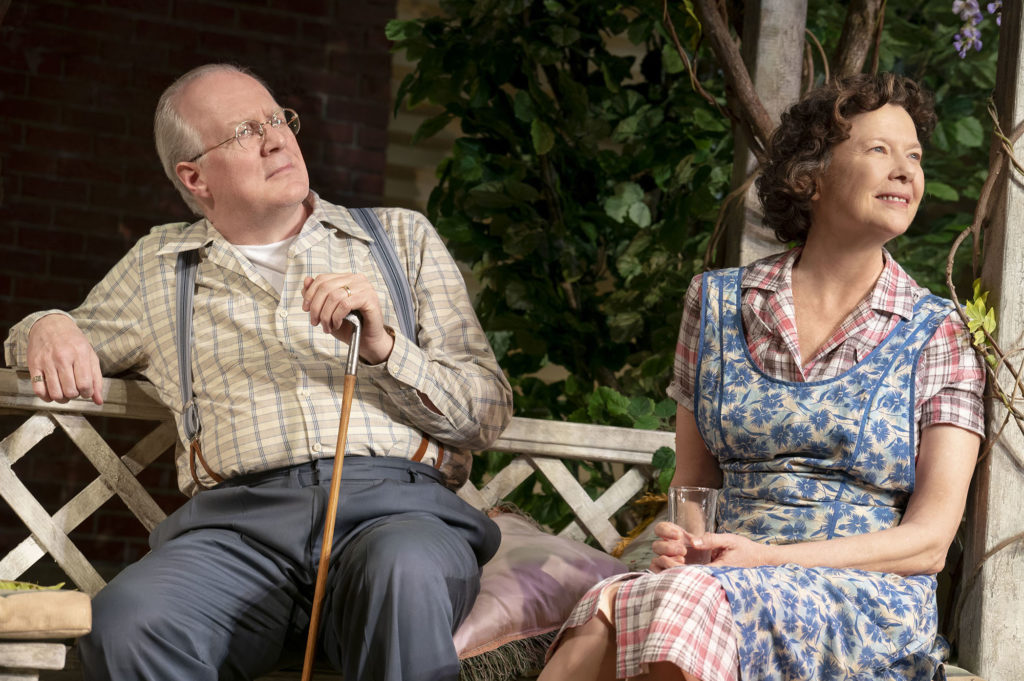
“Facing it—always facing it—that’s the way to get through.”
Joseph Conrad, Typhoon
Terry Teachout on the arts in New York City

“Facing it—always facing it—that’s the way to get through.”
Joseph Conrad, Typhoon

Peter Pears and Benjamin Britten perform Britten’s arrangement of the English folk song “O Waly, Waly” (The water is wide) on the BBC in 1964:
(This is the latest in a series of arts- and history-related videos that appear in this space each Monday, Wednesday, and Friday)

“That a pattering of sounds on the ear should have such moment is a fact calculated to give pause to those philosophers who attempt to explain consciousness by its utility, or who wish to make physical and moral processes march side by side from all eternity. Music is essentially useless, as life is: but both have an ideal extension which lends utility to its conditions. That the way in which idle sounds run together should matter so much is a mystery of the same order as the spirit’s concern to keep a particular body alive, or to propagate its life.”
George Santayana, The Life of Reason: The Phases of Human Progress
* * *
The newspaper movie used to be an established genre in Hollywood, and a consistently popular one. No more: Even as newspapers themselves struggle to survive in the 21st century, such classic films of the past as “The Front Page,” “Call Northside 777” and “Deadline USA” are gradually growing less comprehensible to younger viewers. For this reason alone, anyone who knows anything about the raffish history of print journalism will delight in James Graham’s “Ink,” which has transferred to Broadway after a highly successful London run. It’s a big, loud, aggressively funny play that turns the newsroom clock back to 1969 to tell a fictionalized version of the improbable but true story of how Rupert Murdoch (played by Bertie Carvel) came to England from Australia, bought The Sun and turned it into the hottest tabloid in town, in the process eating the lunch of the Daily Mirror, then London’s “respectable” working-class paper. Staged at a headlong hurtle by Rupert Goold and featuring excitingly raucous performances by Mr. Carvel and Jonny Lee Miller, who plays Larry Lamb, the incoming editor of The Sun, “Ink” moves at so brisk a gallop that the intermission break will catch you off guard.

The Sun is, among other things, the paper that became notorious for boosting its circulation by breaking England’s unofficial ban on printing photos of bare-chested women in newspapers (they ran on the third page of The Sun from 1970 to 2015, and the models who posed for them came to be known as “Page 3 girls”). In “Ink,” the introduction of the first Page 3 girl (played by Rana Roy) becomes the final step in the process by which Messrs. Murdoch and Lamb turn a once-staid paper into a hard-charging tabloid that gives the people plenty of what they want: sex, crime, sports, gossip, “free stuff” and cultural coverage that emphasizes movies, TV and—yes—rock and roll. What’s more, this transformation is for the most part presented non-judgmentally, as a success story rather than a melancholy fable of journalistic virtue besmirched….
It’s no secret that the real Mr. Murdoch (who is the executive chairman of News Corp, which owns both The Sun and this paper) is widely regarded by Britain’s chattering classes as the devil incarnate. This makes it downright flabbergasting that Mr. Graham has portrayed him with seemingly genuine sympathy in “Ink.” How is such a thing possible, especially given the fact that the British stage, like the American stage, is a monoculture in which pretty much everyone lists to the left?
The answer is that “Ink” is not so much about politics, or even journalism, as it is about the British class system, and specifically about the proclivity of bowler-hatted toffs in old-school ties to sneer at the lesser breeds who read, write, edit and (ahem) publish tabloids. Mr. Graham knows that you needn’t be on the right to bristle at such snobbery…
* * *
Read the whole thing here.Excerpts from Ink:
A 1969 TV story about Rupert Murdoch’s entry into the English media market:
* * *

Arthur Miller’s “All My Sons” is back on Broadway, this time in a straightforward, sober-sided Roundabout Theatre Company production directed by Jack O’Brien, performed on an ultra-realistic set and starring Tracy Letts and Annette Bening. It’s one of the best Miller revivals I’ve ever seen, a staging so magnetic that it overwhelmed my lingering doubts about a play that can feel preachy when it isn’t done as well as this….
While it’s no masterpiece, “All My Sons” is soundly built—the plot twists are managed with curve-hugging skill—and wholly stageworthy. Ms. Bening, who hasn’t been seen on Broadway in 31 years, gives a performance of plain-spoken force that makes you long for her to take up residence there permanently. As for Mr. Letts, the author of “August: Osage County” and the foremost character actor on the American stage today, he’s breathtaking as Joe, whom he plays not as a monster of bourgeois greed but as a regular guy of the utmost ordinariness who merely did what he thought he had to do. How can he possibly act as well as he writes? If you think life is fair, don’t see this show….
* * *
Read the whole thing here.A trailer for the Broadway revival of All My Sons:

The thirtieth episode of Three on the Aisle, the twice-monthly podcast in which Peter Marks, Elisabeth Vincentelli, and I talk about theater in America, is now available on line for listening or downloading.
The inspiration for this episode was our discovery that the three of us were sharply at variance on the merits of two recently opened Broadway musicals. Here’s an excerpt from American Theatre’s “official” summary of the proceedings:
What is it like when you go against the critical consensus? Peter, Elisabeth, and Terry discuss this through the lens of Oklahoma! and Hadestown, both of which strongly divide our critics’ opinions. Then they discuss the most perfect casting they’ve seen, and ponder the difference between a bad actor and a miscast actor.
Finally, they go around the table to talk about Classic Stage Company’s revival of The Cradle Will Rock, Junk by Ayad Akhtar at Arena Stage, The Mother by Florian Zeller at the Atlantic, and Burn This by Lanford Wilson on Broadway.
To listen to or download this episode, read more about it, or subscribe to Three on the Aisle, go here.
In case you’ve missed any previous episodes, you’ll find them all here.

Alfred Deller sings Purcell’s “From rosy bow’rs” in an undated film clip:
(This is the latest in a series of arts- and history-related videos that appear in this space each Monday, Wednesday, and Friday)

“The things of men will break—whether weapons, machines or bodies. When that time comes, know what you believe. It will be the only thing that keeps you going.”
John R. Allen (quoted in Chris Seiple, “Stage 4 Cancer and a Brain Tumor: Five Simple Lessons for How I’ve Learned to Live in the Present,” Washington Post, April 4, 2019)
| M | T | W | T | F | S | S |
|---|---|---|---|---|---|---|
| 1 | 2 | 3 | ||||
| 4 | 5 | 6 | 7 | 8 | 9 | 10 |
| 11 | 12 | 13 | 14 | 15 | 16 | 17 |
| 18 | 19 | 20 | 21 | 22 | 23 | 24 |
| 25 | 26 | 27 | 28 | 29 | 30 | |
An ArtsJournal Blog